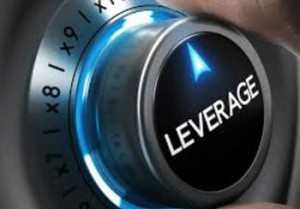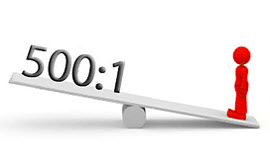If your forex broker is offering leveraged forex trading, it means that they are willing to let their customers trade on credit. In essence, you borrow money from the broker to carry out a transaction. This means that you can make transactions that are much larger than the amount of money in your trading account.
 How much money you can borrow will vary, and is usually based on how much money you have in your account with the broker. It is not difficult to find fx brokers that will let you borrow 50 times, 100 times, 200 times or even 500 times the amount in your account. If you for instance is offered a 1:200 leverage, it means that for each €1 you have in your account, you can borrow €200 from the broker.
How much money you can borrow will vary, and is usually based on how much money you have in your account with the broker. It is not difficult to find fx brokers that will let you borrow 50 times, 100 times, 200 times or even 500 times the amount in your account. If you for instance is offered a 1:200 leverage, it means that for each €1 you have in your account, you can borrow €200 from the broker.
With many fx brokers, the size of the position will impact the amount of leverage available. It is common for large leverage (1:200 or more) to not be available for positions exceeding €50,000.
What’s good about it?
Buy using leverage, you can make large trades without tying up a lot of capital. Let’s for instance assume that you make a €100 trade and end up with a €1 profit (1% profit). If you instead had made a €50,000 trade with the same profit, your gain would have been €500. With a broker that offers you a 1:500 leverage, you only need to deposit €100 to make a €50,000 trade.
Of course, just because you’re offered 1:500 leverage you don’t have to take full advantage of it. You can for instance elect to just use the leverage to double your trade amount. Deposit €100 and use the leverage to make a €200 trade (instead of a €50,000 trade). Only you can decide where the right balance point is, where you utilize the leverage in a way that is beneficial to you without taking risks that are too big.
What’s bad about it?
While using leverage can give you bigger profits, it can also give you bigger losses. Also, since you are trading on credit, you can lose much more money than you deposited with the broker. You can end up in a situation where you own the broker large amounts of money and find it difficult to repay your debt since you have been trading with money that you never owned in the first place.
Example: You deposit €100 with your broker and use a 1:500 leverage to do a €50,000 trade. You end up losing 40% of the €50,000 and now owe the broker €20,000.
 If you had just traded with the €100 you deposited, it would have been impossible for you to lose more than €100.
If you had just traded with the €100 you deposited, it would have been impossible for you to lose more than €100.
Before using any leverage, always ask yourself if you economy can handle a loss. Forex trading is always risky and unexpected things can happen that turns that “sure thing” into a major loss. If you can not afford to deposit €10,000 into your trading account, how will you be able to afford paying back a €10,000 credit to your broker?
Automatic stop loss
A factor that complicates the situation is the automatic stop loss.
Most forex broker that offer leverage will have a safety feature installed that automatically closes your position when it loses more than a certain percentage. Exactly where the stop loss is placed varies, so you should always check up on this beforehand.
A stop loss might sound like a wonderful idea for you as a trader. After all, it puts a stop to your loss, right? The thing is, a stop loss is automatically triggered based on math and will automatically close your position even in situations where you, the human, believe that it would be much better to used keep the position open and ride out the market turbulence.
Once a position has been closed, your loss has been realized and even if the currency in question starts going up again (or down, depending on how you constructed you investment) you wont recuperate your loss because your position has already been closed.
Even an extremely short-lived and understandable dip in currency price will trigger a stop loss, creating a permanent loss in a situation where the position, had it been left open, would have bounced back in no time and maybe even yielded a profit before it was closed manually.
The combination of automatic stop loss and leverage can be very risky for the trader, since your position may be closed automatically and leave you heavily in debt.
Why do fx brokers offer credit to their clients?
Most forex brokers have a businesses model where they make a profit on each trade carried out by any of their clients. Usually, there isn’t a fixed fee per trade. Instead, the forex broker will make more money the more money that is traded by you. So, if you trade €10,000 instead of just €100 the forex broker will make much more money.
Because if this, the forex broker want’s to encourage trade. If you are offered a line of credit (leverage) you can trade for more than what you deposited, and the forex broker will make more money than if you were limited to trading with you deposited money. It’s often safer to use alternative methods to finance your trades, then ending up in debt with the broker.
Leverage (also known as margin trading) is not something offered by forex brokers only; the practice is commonplace with stock brokers, commodity brokers, and many other financial brokers as well. Forex brokers are however famous for their exceptionally big leverages. Where your stock broker might offer you a 1:20 leverage, your forex broker will happily give you a 1:200 leverage or more.
This article was last updated on: January 14, 2016
